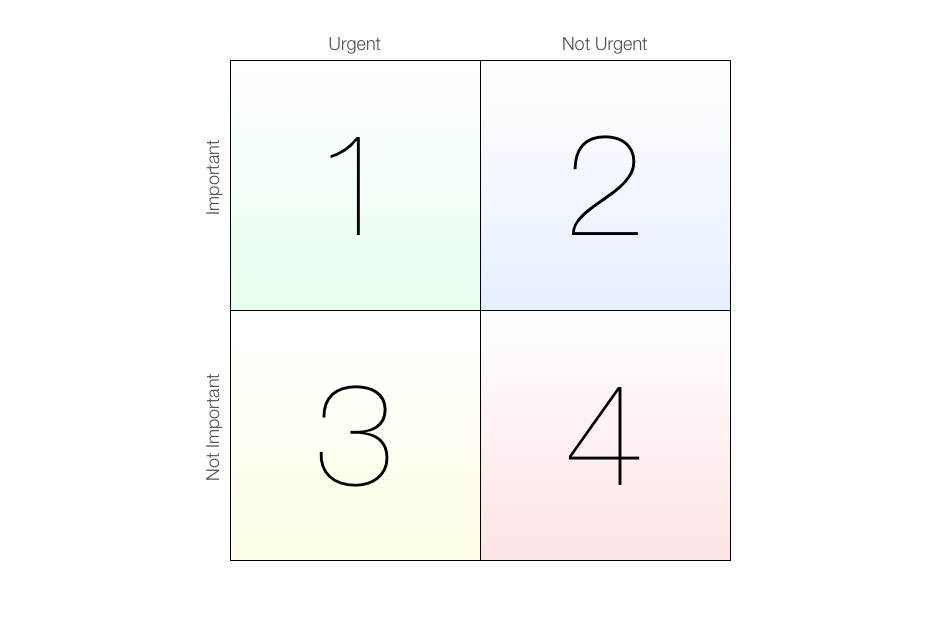Everything we do can be put into one of four quadrants on a grid, depending on whether or not it’s important and whether or not it’s urgent. Keeping this model in mind as you plan (and work) your day will help you keep your attention where it needs to be: on the most important things in your life.

- Quadrant 1 is the quadrant of crisis. You’ve put something off until the last minute, and now it’s time to put out the fires. Problems that get into Quadrant 1 cost more to solve, cause more stress, and crowd out all the things you’d rather be doing. You have to take care of these things, and now.
- Quadrant 2 is the quadrant of growth. It’s all those things you know you need to do but never get around to doing. This is where your most valuable time is spent. Planning, practice, and learning. You know the saying that an ounce of prevention is worth a pound of cure? This is where the prevention takes place. Even sleep and recreation are valuable Quadrant 2 activities.
- Quadrant 3 is the quadrant of interruptions. When you’re in Quadrant 3, someone or something else is pulling you there. A coworker stops by your office, the phone rings, or Mail throws up a notification of an incoming message. Even if you can get right back to what you were working on, it takes much longer for your brain to get back its stride. If you’re in Quadrant 3 by choice, ask yourself why you’re working on something that isn’t important.
- Quadrant 4 is the quadrant of waste. The hard part can be to honestly separate rest and relaxation (Quadrant 2) from procrastination and goofing off. Try to get your time here down to zero.
We all have some Quadrant 1 activities in our lives. It’s hard to completely eliminate them. We are drawn to the excitement and energy of Quadrant 1—we enjoy putting out fires. But those who put out fires (literally) for a living will be the first to tell you how important preparation and prevention are. Some fires can be prevented entirely. Those that can’t, you’ll be better prepared to put them out more quickly.
It’s not always clear into which Quadrant an activity falls, especially interruptions. It’s easy to have a knee-jerk reaction and swear off answering your phone. If your daughter’s school calls, are they just reminding you about the bake sale next week, or is she developing a cold? Even a coworker stopping by to chat can be either a waste of time or a valuable opportunity to build rapport.
It can also be difficult to separate the urgent from the not-urgent. When we have six months for a project, it’s easy to classify the project as something we can work on later when we really need to have started on it yesterday. If we aren’t proactive, anything can slip from Quadrant 2 to Quadrant 1, or not get done at all.
Sometimes, we even conflate urgency and importance. Advertisers do this all the time (“On sale for a limited time—act now!”). There’s an old saying: “A lack of planning on your part does not constitute an emergency on my part.” This is what it’s talking about—urgency vs. importance.
When we aren’t clear on our priorities—which tasks get done prior to others—everything can seem urgent and important. It all has to be done right now. It’s overwhelming.
Work through any Quadrant 1 crises you have, then spend all the time you can in Quadrant 2. As you spend more time in Quadrant 2, you’ll find you need to spend less and less time in Quadrant 1. You’ll finish things before you have to pull an all-nighter. Preventative maintenance will keep things from breaking down (as much). Crises will still happen, but they’ll be fewer and farther between and you’ll be better prepared to respond to them.
Try not to spend any time in Quadrants 3 & 4. Urgent or not, you’ve already decided it isn’t important. Quadrant 3 will just burn you out, and Quadrant 4 isn’t as restful as you think.
Question: How do you keep yourself focused on what’s most important? Share your thoughts in the comments, on Twitter, LinkedIn, or Facebook.

